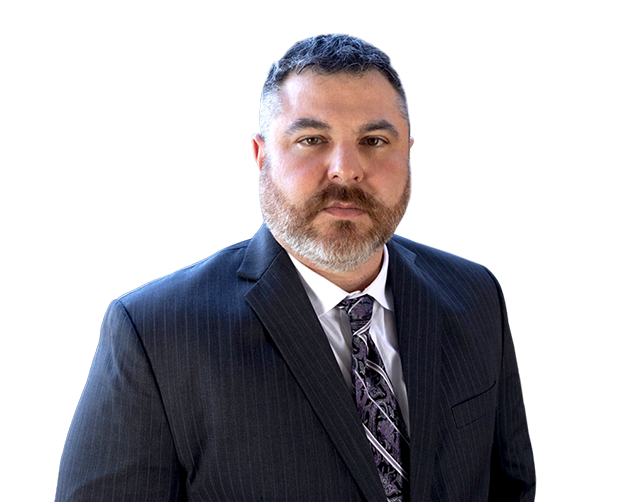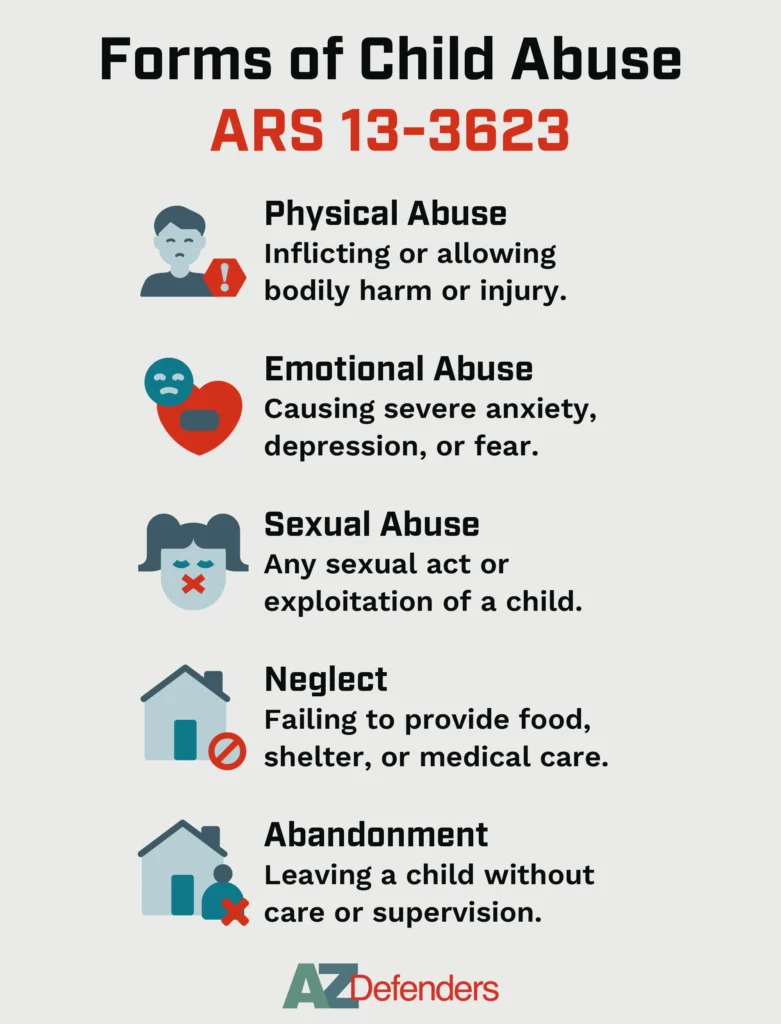
Posted on November 26, 2025 in Assault & Violent Crimes
In Arizona, it is unlawful to cause a child to suffer physical injury, to allow a child to be injured, or to put a child in a situation that endangers that child’s health or well-being. These behaviors are known as child abuse.
Arizona Revised Statutes (ARS) Section 13-3623 is the Arizona law that sets forth criminal child abuse. The law applies to anyone responsible for a child’s care, regardless of that person’s relationship to the child. It covers physical, emotional, sexual abuse, neglect, exploitation, and/or abandonment.
A conviction for child abuse can range from a Class 1 misdemeanor up to a Class 2 felony in increasing degrees of severity, with possible periods of incarceration of up to six months for a misdemeanor offense and up to 24 years for a felony conviction.
If you have been charged with child abuse under ARS 13-3623, call AZ Defenders at (480) 456-6400, or use our online contact form to schedule a free consultation with one of our experienced Arizona criminal defense attorneys.
Understanding child abuse charges in Arizona depends on knowing how the law defines key terms.
The starting point in understanding what child abuse is in Arizona is that the law is not restricted to children. It also covers vulnerable adults.
What constitutes abuse includes a number of different acts, including:

There are a few definitions that can help you understand ARS 13-3623.
In the context of child abuse, to act intentionally or with the intent to commit an act means that a person’s objective is to cause a result or to engage in conduct prohibited under ARS 13-3623.
To act knowingly means that you are aware or believe that your conduct is of a nature or that a particular circumstance exists. It does not require any knowledge of the unlawfulness of the act or omission.
To act recklessly means you are aware of—and consciously disregard—a substantial and unjustifiable risk that a prohibited result will occur or circumstance exists, as defined by the statute.
The risk must be of such a nature and degree that disregard of such risk constitutes a gross deviation from the standard of conduct that a reasonable person would observe in the situation.
To act in a criminally negligent manner means, with respect to a result or to a circumstance described by a statute defining an offense, that you fail to perceive a substantial and unjustifiable risk that the result will occur or that the circumstance exists.
The risk must be of such nature and degree that the failure to perceive it constitutes a gross deviation from the standard of care that a reasonable person would observe in the situation.
The kinds of child abuse under Arizona law fall into two main categories: those likely to produce death or serious physical injury, and those that do not. There are additional subcategories of whether the offense was committed (1) intentionally or knowingly, (2) recklessly, or (3) with criminal negligence.
Under ARS 13-3623(A), a person commits child abuse if, under circumstances likely to produce death or serious physical injury, that person:
For child abuse offenses that are likely to produce death or serious physical injury, the penalties are as follows.
If the offense is done intentionally or knowingly, it is a Class 2 felony.
If the offense is committed recklessly, it is a Class 3 felony.
If the offense is committed with criminal negligence, it is a Class 4 felony.
Under ARS 13-3623(B), a person commits child abuse if, under circumstances not likely to produce death or serious physical injury, that person:
For child abuse offenses that are not likely to produce death or serious physical injury, the penalties are as follows.
If the offense is done intentionally or knowingly, it is a Class 4 felony.
If the offense is committed recklessly, it is a Class 5 felony.
If the offense is committed with criminal negligence, it is a Class 6 felony.
The punishment for child or elder abuse depends on which of the above categories it falls under. Depending on the circumstances of the crime, it can be anything between a class 2 felony and a class 6 felony. The penalties for these felonies are below:
Some possible defenses exist to a charge of child abuse. What follows are some of the most common defenses.
To convict you of child abuse, the prosecution must prove beyond a reasonable doubt that your state of mind at the time of the alleged act of abuse met one of the four required states of mind.
If you can show that you acted reasonably under the circumstances, this is a defense even if harm occurred to the child. For example, an accidental injury does not necessarily rise to the level of an act of child abuse.
Similarly, if you can show that something outside your control caused harm to the child, this is also a potential state-of-mind defense.
Sometimes, someone else may falsely accuse you of child abuse. This can happen in situations involving a contentious divorce.
Corporal punishment, like spanking, is not illegal in Arizona if it is reasonably necessary and appropriate to maintain discipline – but can be a slippery slope.
If you are facing charges of child abuse or abuse of a vulnerable adult, you should not face them alone.
An experienced, aggressive, and effective Phoenix child abuse criminal defense attorney can make all the difference in the world and protect your rights, good name, and freedom. Call AZ Defenders today at (480) 456-6400 or contact us online for a free consultation to see how we can best defend your case.